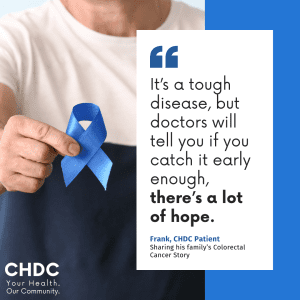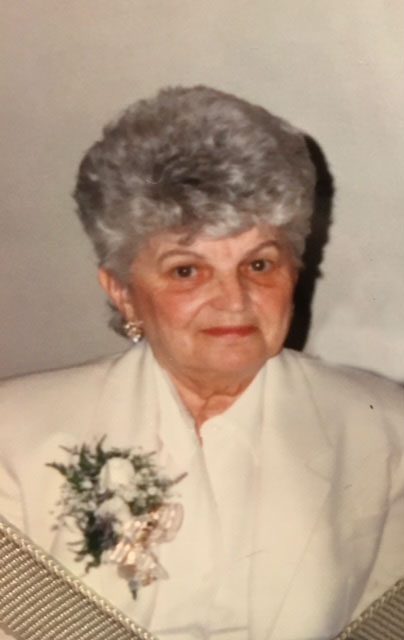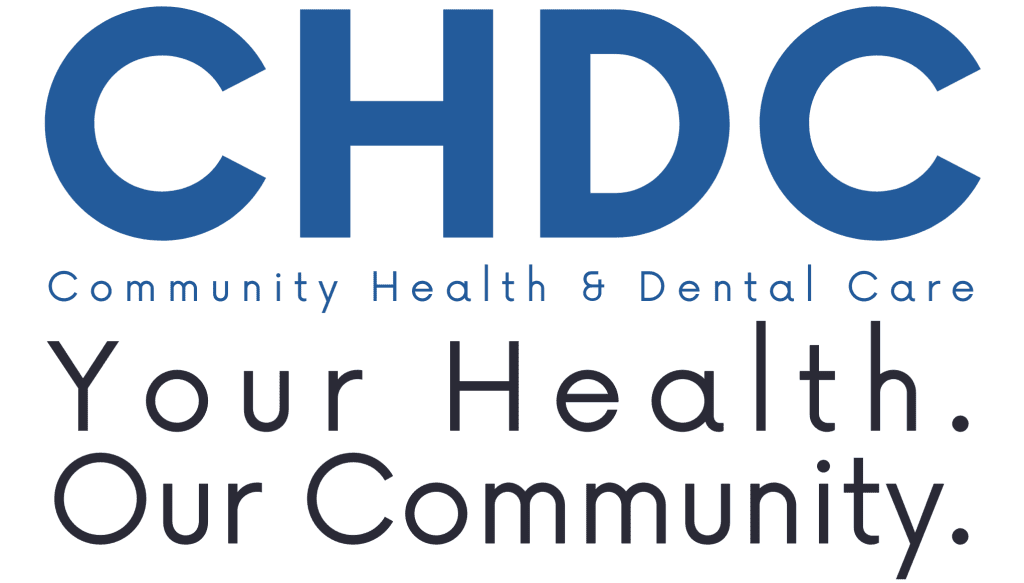Patient Stories
Health Connect: A Patient Story About Colorectal Cancer
March is Colorectal Cancer Awareness Month, and we want to share Frank's CHDC Patient Story to spread awareness about the importance of getting screened for colorectal cancer. After watching this disease take the lives of his mom and brother within a few short years, Frank and his family learned the importance of regular screenings to prevent and treat colorectal cancer.

The Diagnosis
My mom was diagnosed in the spring of 2001 with Stage 4 colon cancer. There was pain and she wasn’t feeling good, so she went to the doctor. At the time, I didn’t know if my grandparents had it and if it was hereditary from them. After going through this and knowing what I know now, it is hereditary in my family. So then, when we knew that mom had it, we all decided that once we reach a certain age, we have to make sure we get checked. The sooner you get checked and they find some polyps, the sooner they can test it and be proactive.
They told her she needed to get chemo, and she tried one round of chemo and said, “no, I can’t do this anymore.” She was in denial. She said, “I don’t have cancer, I’m fine, I feel good.” She was getting blood work every six months, and they were keeping an eye on it, but even the doctor said her mindset of saying that she didn’t have cancer kept her alive for another three years.
Mom's Story
I have a pond in the back of my yard. And during those three years that my mom was very sick, but you’d never know it because she kept denying it, she’d come over to my house and she’d always like to sit on the patio and listen to the pond. When she got to the point where she couldn’t get out to do anything. She spent most of her time in bed, and we would have a nurse come in to check on her, as well as my two sisters taking care of her. I asked the nurse if I could take her out in a wheelchair and bring her over to my house to listen to the pond.
And the last six months [before she passed], I decided that I was going to record the sounds of the pond and I would bring it over to her while she’s laying down and put it next to her pillow so she could hear the sounds of the pond. She always loved it. Sometimes when she was out of it, I would say, “here, I want you to listen to this.” And she would look up and smile. It was something that I wanted to do for her.
She passed away on July 6th, 2005. The last six months, she was starting to go downhill: not eating, getting thin, very tired. But for those three years prior, she was going about, visiting and shopping, and just kept saying, “I’m not sick.”

David's Story
Then my brother, who was only 55 years old at the time, was diagnosed in 2005 with colon cancer. And I don’t remember what stage it was, but it was bad enough that he had to go to Fox Chase for an operation. It was the same sort of thing, diagnosis-wise. He was having pain. We kept telling him to get screened, but he was very stubborn, he didn’t want to get a colonoscopy even though colon cancer runs in the family. He said, “no, I’m not going to have the test.” He was 3 years younger than me, and he was a stubborn kid ever since I could remember.
[The colonoscopy team] was running a little bit late to get to his appointment. He almost walked out! My younger sister had to go with him that day and make sure he stayed there. They did the colonoscopy and found stuff that was cancerous, so he had to have an operation. After the operation, they kept an eye on it, and he was in remission for six months. Then it came back with a vengeance. He was very obviously upset and scared.
I remember he was in and out of the hospital. He found out about this experimental treatment. He paid for this treatment and went down to Florida for it. It just didn’t work; it was too late. I remember coming and visiting him in his house and he couldn’t even eat. He didn’t have an appetite, he was losing a lot of weight, nothing was working. He passed away in July of 2013 and he was only 59 years old.
He was the kind of guy that would walk into a room and just light it up. He had one daughter; they were very close. And to this day, she and his wife still miss him drastically. He always had a smile on his face! The reason I wanted to talk about this is because it’s so important that you go and get checked out, especially if you have a history of colorectal cancer in your family

Be Proactive, Get Screened
It’s important to talk with your doctor and be aware of your options. Some people are hesitant to do the colonoscopy, but there’s other screening options, like testing kits you can do at home. A colonoscopy is the best test for colorectal cancer screening, but the testing kits are a good start. When my Mom passed away in 2005, my brother was diagnosed four years later. He had four years that he could have gone, possibly detected it early, and didn’t.
Colorectal cancer doesn’t get talked about as much as a lot of the other types of cancer. It’s very important to talk to your family members and find out if there’s a history of different medical conditions, like colorectal cancer, in your family. All the information means something to your doctor. Beyond colorectal cancer, things like diabetes, heart disease, and more are all important to talk about with your family. The more that your doctor knows the easier it is for them to diagnose and know what treatment might be.
I have to go and get screened every 3 years because there’s a genetic connection. You really want to get screened and diagnosed as soon as you can, especially if it runs in the family. Even with my kids now, I tell them, “You need to go and get a colonoscopy and make sure everything is fine.” And everybody’s different, you may have to go earlier or more often than recommended based on your family history.
It’s a tough disease but doctors will tell you that if you catch it early enough, there’s a lot of hope. There’s a lot of power in knowing, and some people find peace in not knowing, but there’s so much strength in being able to face something like this.
From CHDC Provider, Neliza Lao, MSN, CRNP, FNP-C, FNP-BC, CWOCN:
"Colorectal cancer (CRC) is the third most commonly diagnosed cancer and the second leading cause of death due to cancer worldwide. In 2020, there were 126,240 new colorectal cancer cases reported in the United States alone. For every 100,000 people, 33 new colon and rectal cancer cases were reported and 13 people died as a result of this cancer.
Survival is higher when colorectal cancer is found before it spreads to other parts of the body. Colorectal cancer almost always develops from precancerous polyps (abnormal growths) in the colon or rectum. Screening tests can find precancerous polyps, so that they can be removed before they turn into cancer. In this way, colorectal cancer is prevented. Screening can also find colorectal cancer early, when treatment works best. The U.S. Preventive Services Task Force recommends that adults aged 45 to 75 be screened for colorectal cancer.
Fortunately, there are several types of colorectal cancer screenings to choose from, including stool tests, flexible sigmoidoscopy and colonoscopy. Colorectal cancer screening tests may be covered by your health insurance policy without a deductible or co-pay so, if you are 45 years and older, the time to be screened for colorectal cancer is NOW."
Thank you to Frank, a member of our CHDC Board of Directors, for sharing his Colorectal Cancer story. If you have a patient story that you would like to share, please speak to your provider or call 610-326-9460 and ask for our Marketing Department.
If you would like to schedule an appointment at CHDC, please call 610-326-9460 to speak with a Patient Services Representative.

